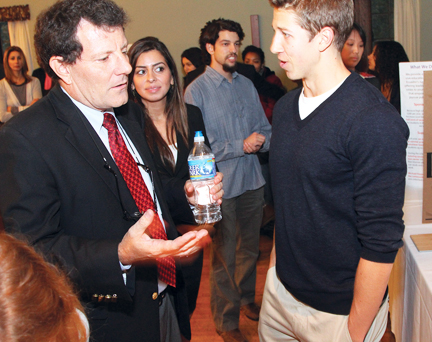“Give Your Parents Gray Hairs”—Kristof
 “In some past life I’m pretty sure I was a Swattie,” said Nicholas Kristof, the two-time Pulitzer Prize winner and New York Times columnist, who says he is a huge fan of Swarthmore.
“In some past life I’m pretty sure I was a Swattie,” said Nicholas Kristof, the two-time Pulitzer Prize winner and New York Times columnist, who says he is a huge fan of Swarthmore.
Referencing Swarthmore student initiatives, including those sponsored by the Lang Center for Civic and Social Responsibility, Kristof stressed that traveling abroad—daring to step out into an unfamiliar environment—plays a transformational role in students’ ability and motivation to become involved in “the world’s fight.”
“It’s important to get out of your comfort zone. And if you’re having a wonderful time, then that’s not exactly right. You want to be in over your head. You want to give your parents gray hairs.”
Kristof’s interest in human rights has been driven by personal encounters, he said. He was galvanized to report on human trafficking when he heard the story of two girls in Cambodia, tricked and kidnapped on their way to school by an old woman who wanted to sell them to a brothel. He went on to emphasize that, although the human trafficking situation in the United States is better than the situation in Cambodia, there is still much to do here at home.
In addition to emphasizing local activism, Kristof underscored the importance of choosing a cause that has personal meaning and relevance. “Students ask me, ‘There are so many issues, what should I get involved in?’ And the answer to that will depend on where you’ve traveled, what issues speak to you the most, what resonates with you.”
He noted that, in reference to social entrepreneurship, he has “become increasingly sympathetic to the notion of starting something particular.”
“When my generation was active, we tended to protest against things, we tended to seek systemic global change, and, often, the focus of our protests was kind of symbolic. My generation would have protested for some kind of global covenant to get every kid in the world in school. Your generation is much more likely to start a particular school somewhere. It may not solve the global problem, but for kids in that particular school, it is completely transformational.”
—Kat Clark ’12, adapted from the Daily Gazette. Nov. 17, 2011
 Email This Page
Email This Page